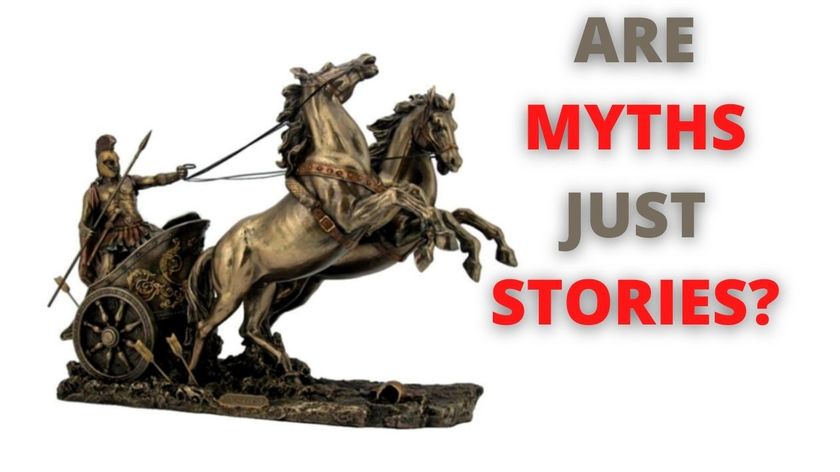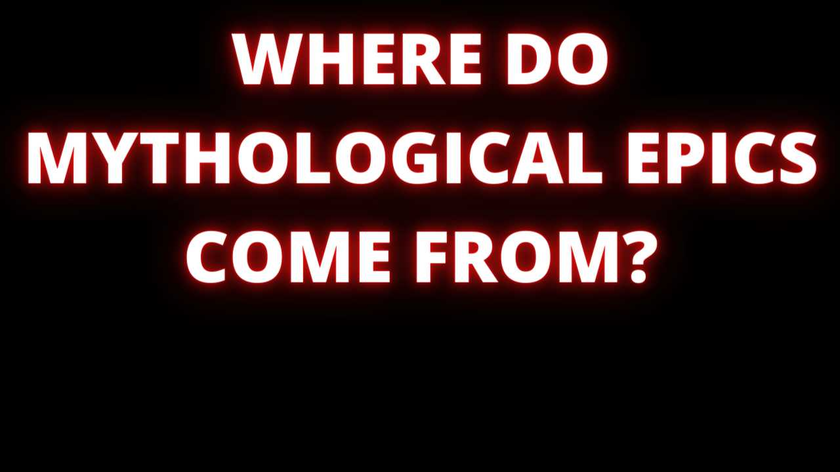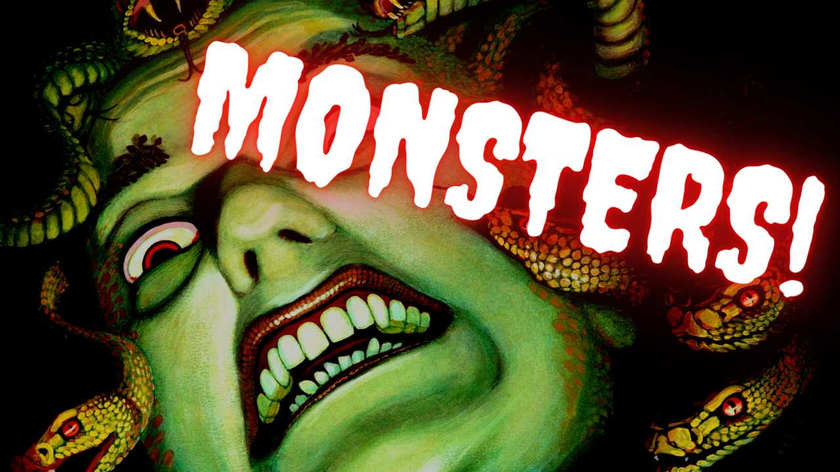Follow me here and:
Odysee https://odysee.com/@Mythologos:3
Gab
https://gab.com/Mythologos
- This post collects Mythologos Digest #1-#3, originally posted on https://odysee.com/@Mythologos:3
ARE MYTHS JUST STORIES?
When we hear the word myth, three things come to mind: Heroes, Monsters and Gods. That’s understandable, those are the three elements that are associated most frequently with myth in popular culture. As I have outlined in the Mythologos Podcast: in my opinion stories, music, images etc. are all tools used to illustrate the meaning of rituals, but it is the experience of the initiate that is the actual ‘myth’ were are looking for. To some, this downgrades the stories that have been passed down and adapted into mediums like illustration, comic books, novels, films and video games. What is Thor without his hammer, Zeus without his lightning bolt or King Arthur without Excalibur? Isn’t there a direct lineage from these elements and images to our contemporary fictional heroes, like Luke Skywalker, Harry Potter, Frodo and Iron Man?
From my point of view, that is not the case, but that doesn’t necessarily relegate these types of stories to a narrative ghetto. If we are to approach these stories as just stories, separated from their ritual utility and other culture-binding origins, it is best to leave myth out of it; when we say that the great tales are myths and that they never happened, we negate our experience in the present, in effect saying that we are having a non-experience, which raises the question, why even bother?
STORIES AS STORIES
I love stories more than anything else in the world, especially imaginative stories, that’s why I’m a writer and why I wrote Carrot Field. The greatest treasure of humankind is the endless store of narrative it has created. The most important thing I learned from studying that vast ocean of story we call folklore, oral tradition or ‘myth’ is that the people of antiquity were not ignorant, as they are frequently portrayed in popular entertainment, not savages living under a dark cloud of superstition: their beliefs might seem alien, even disturbing, to us today, but each system of beliefs was a complex network of interconnected ideas that gave expression to thoughts, emotions, dreams, observations and ambitions. It’s true that the farther back you go, the more rudimentary characterization becomes, but even in Gilgamesh, The Iliad, The Book of Samuel and the Mahabharata, there are moments that deliver all the depth of Shakespeare and Tolstoy. These characters and stories feel closer to the reality of the human experience, to me, than their latter day counterparts.
It’s unfortunate that we gloss over the voices of the deep past, of real human experience, searching for Hero’s Journeys and Archetypes. We’re missing out on hearing the true voices of the inspired poets who wove those strands of story together from thousands of disparate threads, creating cohesion from a cacophony of sources, as tribes and peoples were drawn together into Nations, City States and Empires. Individual genius is lost in the search for a Monomyth, which credits biology or the unconscious for that priceless wealth of narrative. I believe that the dignity and position of the natural bard is restored when we look on these stories as stories: works of creativity, adaptation and always, improvisation.
HERO & QUEST STORIES AS A GENRE
There certainly exists a special kind of story that enshrines the Promethean aspect of human nature, that of the hero who forges their own path and defies fate, even if their fate cannot be avoided (the origin of Tragedy, and also of Comedy). I don’t deny that heroes share certain inevitable traits, those are the traits we call heroic, it’s circular. The word hero means “demi-god”, no ordinary person! And whether it’s Superman, Beowulf, Sherlock Holmes or John McClane, we cannot help but be inspired by heroes. These outlandish characters help to define whom we consider to be a hero in the real world. No doubt, these hero-tales were used to enhance rituals, ceremonies and holy days because of their inspirational aspect. But every individual part of a ritual, without a ritual, can be and has been made into entertainment: stories, music, dance, icons and images, masks and costumes etc. But ritual itself has never been and will never be popular entertainment. The essence of ritual transcends its component parts.
There is such a thing as a hero character, and hero stories, and stories of quest and conquest. Heroes do help to guide us in the ongoing work of fashioning the self. But they are not myth. Myth is the heart and mystery of the ritual and it transcends even the most artful expression of story.
MYTH VS. CULTURAL STORY CYCLE
The term "myth" has pretty much lost all meaning. It is a word that can mean anything. If "myth" can mean anything then it means nothing.
Over the past thirty-plus years, I have dedicated much of my life to getting to the bottom of what we mean when we refer to something as a myth. I've settled on an observation; not a theory, the idea is too wide-ranging to form the basis of a concise scientific theory. My observation has been that when myth is referred to, it is overwhelmingly to describe an experience. The individual is profoundly moved, and motivated, they do not know how but they are certain that something real has happened to them. The experience is usually delivered via art or entertainment, this is why the bulk of pop-culture mythography is focused on franchises/series such as Star Wars, Harry Potter and Marvel Comics. But in this instance, the experience is only inferred, not defined, by the narrative or images in question. In other words: these themes, scenes, story structures, character types and images can be found elsewhere, but the individual has only just had the powerful experience of being in the presence of myth. If the elements that make up these popular narratives are so common, why is the myth experience so variable and not universal? Perhaps there's an underlying structure that is universal? Unfortunately, many such structures have been proposed, all of them lacking a plausible mechanism.
For all of the above reasons, I have stopped using the word myth when referring to the elusive myth experience. According to my point of view, a story is a story, a character a character, a plot a plot, images are images etc. There are no "special" types of things that are intrinsically "mythic". That is not the myth, the myth is the experience. As for the nature of that experience, I'll save that for another Digest entry.
The point here is: if we don't call the great body of world narrative associated with myth our "myths", what do we call them? I have settled on Cultural Stories and Cultural Story Cycles. It's not that complicated:
Stories predate entertainment. For most of human history, stories have served a primarily utilitarian purpose, the greatest being for use in rituals (of all kinds: rites of passage, initiations, births, coming of age, weddings, funerals, Holy Days, seasonal and astronomical cycles, planting, harvesting, wars, healing etc.) that strengthen cultural bonds. For instance, hero stories present idealized cultural figures, and if they end tragically, highlight the importance of obeying cultural norms of virtue and taboo. While it appears that in most cultures, itinerant storytellers have existed, and were well rewarded for entertaining eager audiences, such activities were rarely organized and usually irregular, it was not a precursor to the entertainment industry. Additionally, the stories themselves would not have been successful if they were not already closely associated with culturally important, shared experiences (rituals in particular).
So, it is safe to say that this is a particular kind of story. Since they are all ethno-cultural in nature, I can't think of a better way of referring to them than as Cultural Stories: culture-specific narratives that bolster, reinforce and codify the core cultural narratives.
But what about the epics? It has to be understood that the great epics are aggregate-narratives, the result of a long process: local stories travel by word of mouth, are adapted, and in turn are localized themselves - as the dominant group grows and absorbs peripheral groups, the stories are further adapted and compiled into super-narratives - when the dominant core-culture achieves the status of city-state or nation, the super-narrative is further refined and codified to reflect the core-culture. Such epics usually serve didactic religious, national, ethnocentric or combined purposes, regardless of their "entertainment" value; dissemination via itinerant storytellers; or the continued parallel existence of past, local variants of individual tales. I call these epics Cultural Story Cycles, since the disparate stories are connected together in serial fashion, moving from episode to episode in a character's life and on to successive generations, forming an artificial but generally cogent cycle. In future Digest entries, I will be taking a closer look at the great tales we call "myths".
For me this solves two problems: separating the concept of myth from the stories associated with the myth experience and giving an accurate name to those stories. One thing I'm sure of is that the term "myth" is overused and applied without care. It's time for a new approach.
THE CULTURALLY BINDING RITUAL
There are many kinds of ritual, but the kind that interests me most intensely is the culturally binding ritual. It is these kinds of rituals that are most consistently associated with narrative, primarily Cosmogonic (creation), Cosmological (ordering) and Ethno-National (societal).
"Culturally Binding" is a bit of jargon of my own concoction, and there are many recognized rituals that fall under this heading, but my focus is on Rites of Passage, which mark the individual's progression through the stages of life. I have come to the conclusion that it is the experience of the initiate that is the essence of what we call "myth"
How does this actually work? All rituals are, to a greater or lesser extent, cultural: they reinforce and promote the continuance of core cultural principals. I've concocted my own term because there's a lot of theoretical overlap here, and the only way to express that anthropologically is to use a lot of technical terminology. What overlaps, in my opinion, is the utility: the utility is the process of re-integrating the individual into society after their passage from one phase to the next. This is the very beating heart of the matter.
Empires and other pseudo-fascistic constructs can subsist, making incredible surface-level displays of power (real or illusory, many of the most fearsome nations in history were running on fumes in terms of resources and fighting forces at the zenith of their size and influence), with empty rituals that merely keep the population bound to a social contract that only benefits those at the top of the pyramid.
A fully functioning and healthy society dares to empower the individual; the irony here is that that empowerment is realized through rigid enforcement of societal structures, but this subservience to a higher calling benefits the whole, not only the topmost. This appears to me to be the only natural way of checking destructive, hierarchical top-down authoritarianism or cultural disintegration. At its best, it maintains a balance between the permanence of tradition and the unpredictable, agile, organic development of society. It comes at a high price, though, and not many living in the 21st century would be willing to pay it; at any rate, it does not seem to work for long on a grand scale, and once a nation becomes a real super-power, it is inevitable that the balance will be disturbed.
So - what does all of this have to do with myth?
CONCRETE NARRATIVE, ABSTRACT EXPERIENCE
The symbols that define a culture are abstractions. Regardless of what iconography attends these concepts, it is difficult to describe exactly what civic duty really is, that is why it is so easy to subvert and overwrite. That's where narrative comes in. Narrative provides a framework, that of a story, within which the individual can situate themselves and gain perspective on their progress as a member of society. By reenacting, witnessing a dramatized version, or participating in a ritual that is loaded with the images of a narrative that materialize the abstractions, ideal and reality are combined into a single, life changing, experience.
Having surveyed many thousands of ritual/narrative pairings across the globe and recorded history, I believe that the narratives employed in rituals undergo a predictable aggregating process. Primitive Cosmogonic and Cosmological narratives are woven together to give the ethno-national narrative historical grounding and spiritual significance, they also preserve narratives once belonging to smaller groups that are absorbed into the new, larger society, no doubt easing integration of groups that were once bitter enemies or in competition for local resources, an appeasement of sorts, as well as a narrative necessity ("Where do we come from? What is the meaning of life? What happens after we die? Who were we before we were this?" ). Ethno-nationalist narratives are grouped closer to what is called National Epic, a loose and dated term, but a decent way of describing the pseudo-historical in-group narrative ("Who are we, as a nation, a culture, a people? How is our culture an improvement upon and the inevitable outcome of all that came before? What does it mean for the individual to be a part of this society?" ). You can see, repeated across cultures, the assignment of Cosmogonic and Cosmological narrative primarily to landmark Rites of Passage, and other narratives to other rituals, observances and ceremonies.
THE ESSENCE OF MYTH
The great cultures are dead or dying, the binding rituals abandoned or watered down to nothing, tradition fades away in the glaring spotlight of heedless progressivism. But the stories, their motifs and archetypes, remain. When an individual catches a glimpse of those elements in art, entertainment, nature or ceremony, the brain switches into a receptive mode, to ready them for the ritual. No ritual is forthcoming, at least no true ritual, that will liberate them from one phase of development and deliver them safely into the next. That is why no pop culture franchise can satisfy the need for Myth, the re-integration of the individual into society as a "new person", serving a new and higher purpose, satisfying their own need for advancement as well as the needs of society. No movie, television series, novel or video game can deliver the complete experience of Myth. So we binge and cosplay and immerse ourselves in virtual "realities" that are crammed with associated motifs, archetypes and images that once served ritual, all to no avail – the empty feeling inside persists.

Tolkien is said to have created a "modern myth" but what did he believe about the nature and essence of myth?
A trailer for the 15 volume epic novel OMNIAD, focused on the enigmatic character of Crow!
-
Mythologos Special #5: Narrative Selection
-
Where Do The Great Epics Come From?
The epic is the genre of literature most closely associated, in popular imagination, with the myth experience. Such long-form narratives, the Iliad, Odyssey, Gilgamesh, Tain etc., are held up as source texts for "our myths". It is true that these epics contain narratives that were, in all probability, closely associated with ritual and the myth experience, but I do not believe that the narratives themselves constitute mythologies. That issue is explored in the first three installments of Mythologos Digest and previous episodes of the podcast. The question remains: where do these long, complex narratives come from?
The standard (and I believe correct) explanation is that they descend through a long, slow process of oral dissemination, spreading throughout a region, and are gradually melded, honed and stitched together into a super-narrative, or epic.
I look at this as a process of elimination and aggregation. ...

Did you know that Cerberus had a brother? Find out more in this fully illustrated, downloadable PDF article!
Mythologos Digest #4
What Is A Monster?
Like many words associated with the world's oldest stories, the word monster is ultimately of unknown origin, it may go all the way back to Proto Indo-European. According to dictionaries, our usage comes via Latin, monstrum, referring to an omen, and Old French, monstre, in reference to a malformed or deformed animal or human. Even today, in some parts of the world, such as India, extraordinary deformities (including gigantism) are seen as a divine sign, perhaps a harbinger of impending calamity. By the sixteenth century, monster was taken to mean giant, and was applied to maps probably in reference to whales; it also took on the meaning of a person or creature of incredible cruelty or viciousness. That is how the various creatures from the world's great hoard of stories came to be called monsters.
Pop Monsters
In fantasy literature, it has become customary to look at "mythical monsters" as members of a species or race, but this is rarely true in ...













